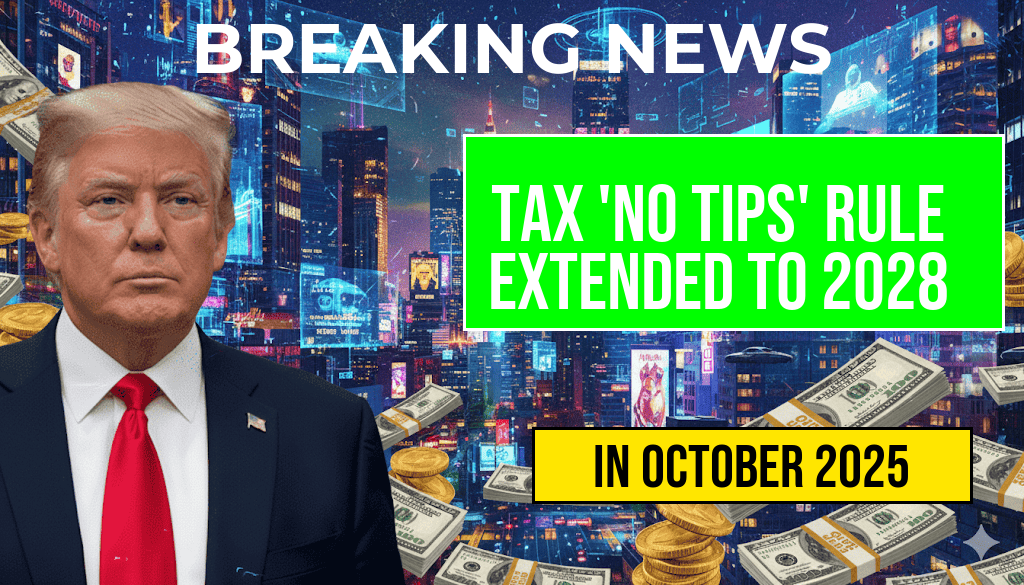Tax ‘No Tips’ Rule Extended Through 2028 with a $25,000 Annual Cap You Can’t Overlook
The IRS has announced the extension of the temporary ‘No Tips’ rule, allowing employees in tipped industries to benefit from a significant tax exemption through the year 2028. Under this provision, workers can earn up to $25,000 annually in tips without those earnings being subject to federal income tax or mandatory withholding. This extension provides essential relief for service workers amid ongoing economic uncertainties, offering clarity and stability for both employees and employers. The rule, originally introduced as a temporary measure, aligns with broader efforts to simplify tax compliance and support industries heavily reliant on tips, such as hospitality and food service. As the deadline approaches, industry stakeholders are assessing how this cap impacts wage structures, payroll planning, and tax obligations across the sector.
Background of the ‘No Tips’ Rule Extension
The Taxpayer Certainty and Disaster Relief Act of 2020 initially introduced the temporary ‘No Tips’ tax exemption, during a period when many workers faced reduced hours and earning instability due to the COVID-19 pandemic. Recognizing the importance of this measure for the service economy, the IRS decided to extend the exemption through 2025, with the latest announcement extending it further to 2028. This move aims to reduce administrative burdens on both employees and employers by clarifying the tax treatment of tips and enhancing income predictability for workers in tipped roles.
Details of the $25,000 Cap on Tips
| Feature | Details |
|---|---|
| Annual Tip Income Cap | $25,000 |
| Effective Period | Through December 31, 2028 |
| Tax Treatment | Tips up to cap are exempt from federal income tax and withholding |
| Beyond Cap | Tips exceeding $25,000 are taxable and subject to standard withholding |
| Application | Applicable to all tipped employees earning tips in qualifying industries |
This cap is designed to balance the need for tax compliance with recognition of the typically modest earnings of many tipped workers. It provides a threshold below which tip income remains tax-free, simplifying the reporting process and reducing tax burdens for lower-earning employees.
Implications for Service Industry Workers and Employers
The extension of the ‘No Tips’ rule offers tangible benefits for workers and businesses alike. Employees can retain more of their earnings without immediate tax deductions, potentially improving take-home pay. Employers experience reduced administrative complexity because they are not required to withhold taxes on tips within the cap. However, workers earning above the cap will need to report and pay taxes on their excess tips, emphasizing the importance of accurate record-keeping.
Industry leaders view this extension as a positive step toward maintaining workforce stability, especially as many establishments recover from pandemic-related setbacks. The policy also aligns with efforts to modernize payroll processes and ensure compliance with evolving tax laws.
Legal and Tax Considerations
Tax experts highlight that the extension clarifies the tax treatment of tips but does not eliminate the obligation to report all tip income. Employees are advised to keep detailed records, such as daily tip logs or electronic receipts, to accurately report earnings exceeding the exemption threshold. Failure to report tip income properly can lead to penalties or audits.
For employers, understanding the cap’s parameters is essential for payroll processing and compliance. They should update payroll systems to reflect the extended rule, ensuring that tips within the $25,000 limit are not taxed, while properly withholding on excess amounts. More detailed guidance can be found on the IRS website (irs.gov).
Stakeholder Reactions and Future Outlook
- Worker advocacy groups praise the extension for providing financial relief and simplifying tax reporting procedures.
- Industry associations emphasize the importance of clear policies that support economic recovery and workforce retention.
- Tax professionals recommend that tipped workers and employers stay informed about reporting obligations, especially as the extension approaches its final years.
As discussions continue regarding potential permanent reforms to tip taxation, the current extension offers a stable framework for the coming years. Policymakers and industry stakeholders will likely monitor the impact of this policy on workers’ income stability and tax compliance, shaping future legislative decisions.
For more information on federal tax policies affecting tipped workers, visit the Wikipedia page on Tip Income or consult with a qualified tax professional.
Frequently Asked Questions
What is the main change in the tax ‘No Tips’ rule extended through 2028?
The main change is the extension of the no tips rule until 2028, with an annual cap of $25,000 on the amount that can be excluded from taxable income under this provision.
How does the $25,000 cap impact restaurant and hospitality workers?
Workers in the restaurant and hospitality industries can exclude up to $25,000 of tips from their taxable income each year, helping to reduce their tax burden within this limit.
What are the eligibility requirements to benefit from the extended ‘No Tips’ rule?
Eligible workers must receive tips that are reported to their employers and must meet existing reporting and compliance standards to benefit from the extension.
When did the extension of the ‘No Tips’ rule take effect, and how long will it last?
The extension was officially enacted to last through 2028, providing ongoing relief for workers in tip-earning industries.
Are there any additional requirements or considerations for taxpayers under this rule?
Yes, taxpayers should ensure they properly report their tips and stay informed about any changes in regulations to maximize benefits and remain compliant with tax laws.

Leave a Reply